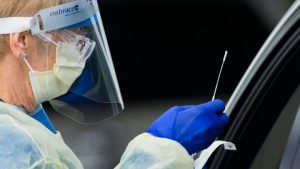Falling COVID-19 test numbers pose ‘huge problem’ for reopening in Ontario, experts warn

The number of COVID-19 tests completed each day in Ontario is steadily dropping, despite warnings by experts that the province actually needs to ramp up testing if it is to successfully reopen this summer and avoid a fourth wave.
Ontario reports 1,616 new COVID-19 cases, fewest since March 24
On Monday, only 24,498 test results were released in Ontario, the lowest number since last fall, and less than half of the province’s lab capacity, according to provincial data.
Testing numbers on Mondays are always lower than other days of the week, likely because fewer tests are conducted and processed on weekends, but this Monday’s number of test results released was 23,000 lower than that of Monday, April 12
On Tuesday, even fewer test results were released at 22,915.
“That’s a really huge problem,” said Colin Furness, an infection control epidemiologist and assistant professor at the University of Toronto.

Even with nearly half of Ontarians receiving their first dose of a COVID-19 vaccine, testing and contact tracing are more important than ever to zero in on outbreaks and eventually eradicate the disease, he said.
“The end game here is not vaccination. It’s getting rid of COVID and testing never ceases to be a vital part of that,” Furness said. “It’s very disappointing to me we have not been working to increase testing, to increase it a great deal.”
The Ministry of Health did not respond to a request for comment.
Testing needs to be more accessible, experts say
When businesses start to reopen, most likely in June, the province will need a highly accessible, robust testing system to track and control outbreaks, said Ashleigh Tuite, an epidemiologist and assistant professor at the University of Toronto’s Dalla Lana School of Public Health.
“As we start talking about, ‘When is the stay-at-home order going to end? When are we going to start having a return to hopefully a more normal-looking summer?’ it becomes critically important to do enough testing,” Tuite said.

Even now, as the lockdown continues, the test positivity rate remains high at 7.6 per cent on Tuesday, the province reported. That suggests there are likely more people who have COVID-19 but haven’t gotten tested and cases are missing from the data, Tuite said.
“It’s something we’ve been dealing with the last 14 months and I don’t think we’ve made a lot of progress,” she said.
Epidemiologist Maria Sundaram said while it might sound counterintuitive, testing will become even more important as there are fewer cases, because that’s when public health will be able to investigate and understand every single outbreak. Scientists will also need testing data to see how well vaccines stop transmission.
“If we don’t know where cases are and we can’t service those people, we are going to be facing the same problem a year from now,” said Sundaram, a researcher with ICES Ontario, a not-for-profit research institute
Experts don’t know for sure why fewer tests are being completed, but it’s likely a confluence of factors.
Politically, the provincial government is focused on vaccinations, so testing “takes a back seat” when really capacity should keep increasing to at least half a million tests a day, Furness said.
The focus should be on making testing more accessible and not only offered at clinics, but at workplaces, too, he said.
“When you set up in hospitals and open the doors and say, ‘Come on down,’ you’re signalling to people with means, cultural capital, trust and leisure time that they need to go get tested, but you’re not reaching the high-risk people,” Furness said.
When restaurants reopen, for example, he suggested testing staff a couple of times a week.
As people get their first vaccine dose, they’re probably less likely to get tested if they come into contact with COVID-19 or have symptoms, said Tuite.
“We certainly haven’t heard a lot of messaging around, ‘If you’re vaccinated and have symptoms, still get tested,’ but it’s important,” she said.
“We do want to know how vaccinations are working in our population.”
The ideal “testing paradigm” is that they’re so freely and easily accessible that for most people it becomes a weekly routine to get tested, Sundaram said.
“It would almost be like you could be accidentally tested,” she said.
“Where you go to the grocery store, you see they’re giving free tests here. ‘Oh, I will just get one.'”





Redes Sociais - Comentários